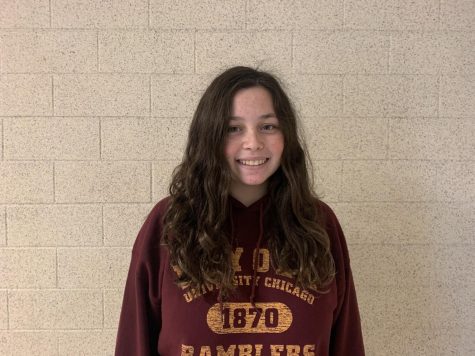Social media has created unrealistic body expectations for teens everywhere
Opinion Editor Marin Klein writes that social media platforms, such as TikTok and Instagram create unrealistic body goals for teens which leads to unhealthy habits and expectations.
June 9, 2021
“I wish that I could look like that.”
This is a sentence many of us have probably thought or said before. I constantly find myself scrolling through TikTok or Instagram, wondering why I don’t look like the girls that show up on my feed. Social media has become a part of all of our daily lives and being filled with photos and videos of seemingly flawless people, these platforms have created completely unrealistic expectations for teens.
When scrolling through social media, users tend to only see certain body types, making our brains believe that because our bodies are different, we aren’t as good. Although these body types consume social media, in reality, they make up only a small percentage of all the different body types there are. We find ourselves constantly comparing our looks to the famous influencers and models we see on our screens. Most of the time, the pictures we see are heavily edited to make them look perfect, and in return, they make us question why we don’t look like them. The pictures we see are idealized and not real.
Seeing these “perfect bodies” all over social media has led to a generation that never seems to be satisfied with their bodies, constantly comparing themselves to others. It has gone so far that teens are trying drastic ways to lose weight or gain muscle fast: all over the world, teens are developing body dysmorphia, starving themselves, or overexerting themselves at the gym to meet their “ideal body.” Not to mention over the past year, we have spent even more time on social media, and as a result, more and more people have been developing eating disorders.
The toxicity of the social media environment has also been seen through backhanded comments on videos. When a skinny girl posts a video, her comments are usually filled with statements such as “that’s ok I wasn’t hungry” or “you should eat something.” On the other hand, a larger-sized girl usually receives comments like “I wish I was that confident,” or “I love that you don’t care about what people think.” Boys go through the same thing if they are too skinny or too muscular: they hear things like “oh he’s just showing off” or “maybe you should go to the gym.” These anonymous commenters criticize every single person no matter what they look like, thinking that it counts as standing up for others.
We need to open our eyes to the fact that no one is built the same way, and starting dangerous habits just to match an unrealistic body type isn’t something that should be happening. Social media and editing apps have made us insecure about ourselves and has forced us to take extreme measures to try and solve those insecurities.
Creators on Tiktok and Instagram have tried to promote body inclusivity, but more needs to be done. Social media needs to be an inclusive place, meaning no more backhanded comments about anyone’s body, less editing bodies to create a false reality, and less promoting of companies that only target certain body types. There are young, impressionable kids that have social media, and they could develop unhealthy habits based on what they see. Just because we don’t all look like that model or athlete doesn’t mean we are any less than them.











